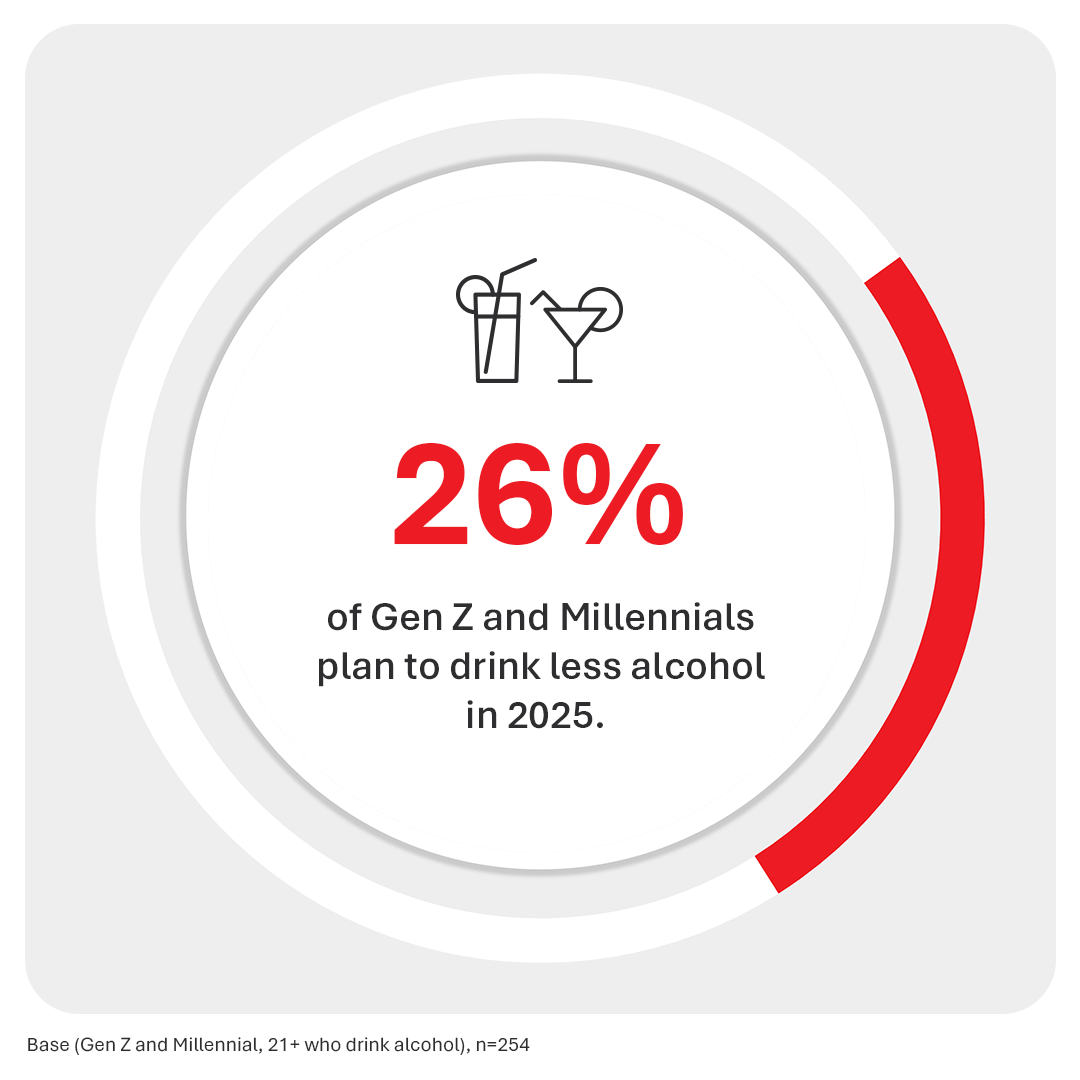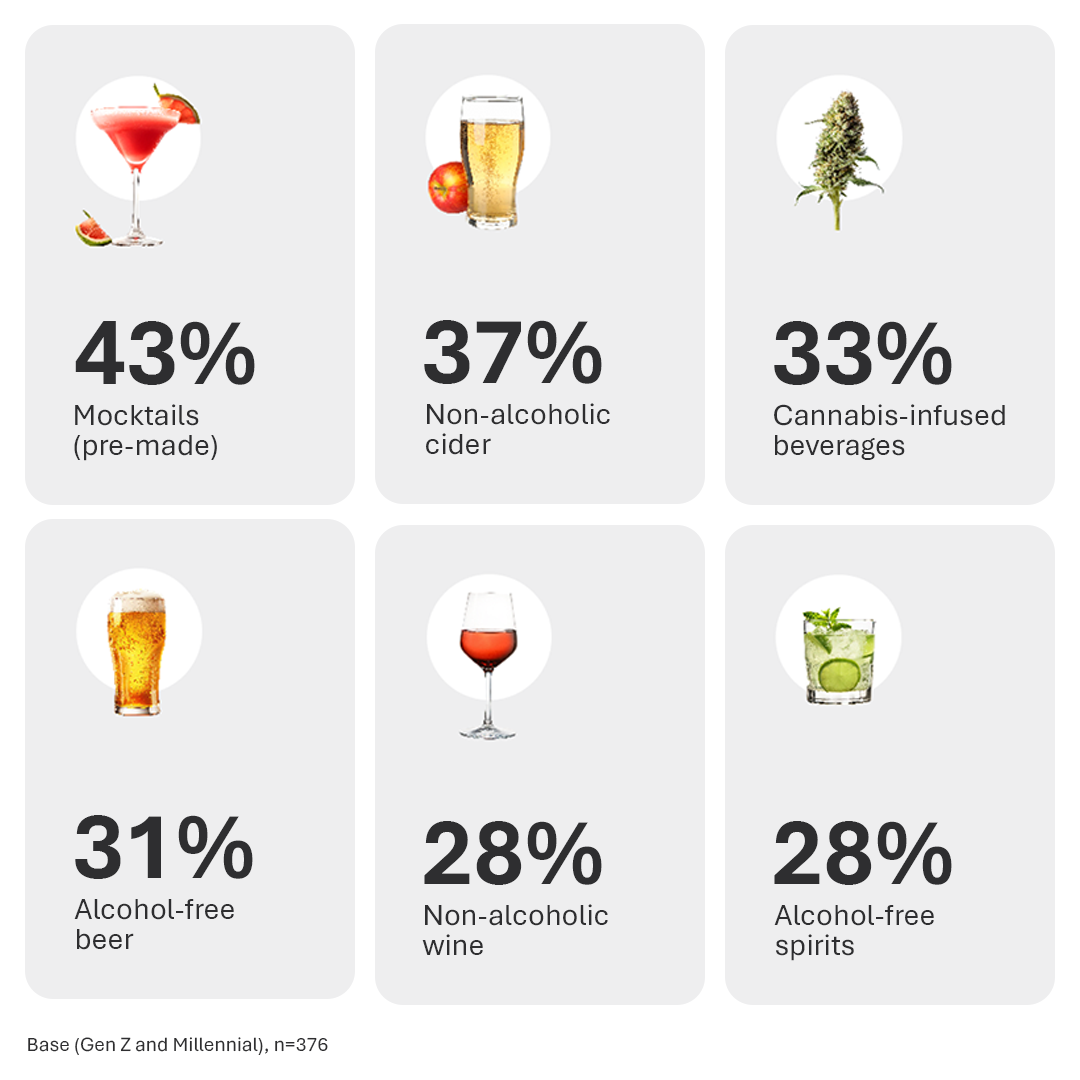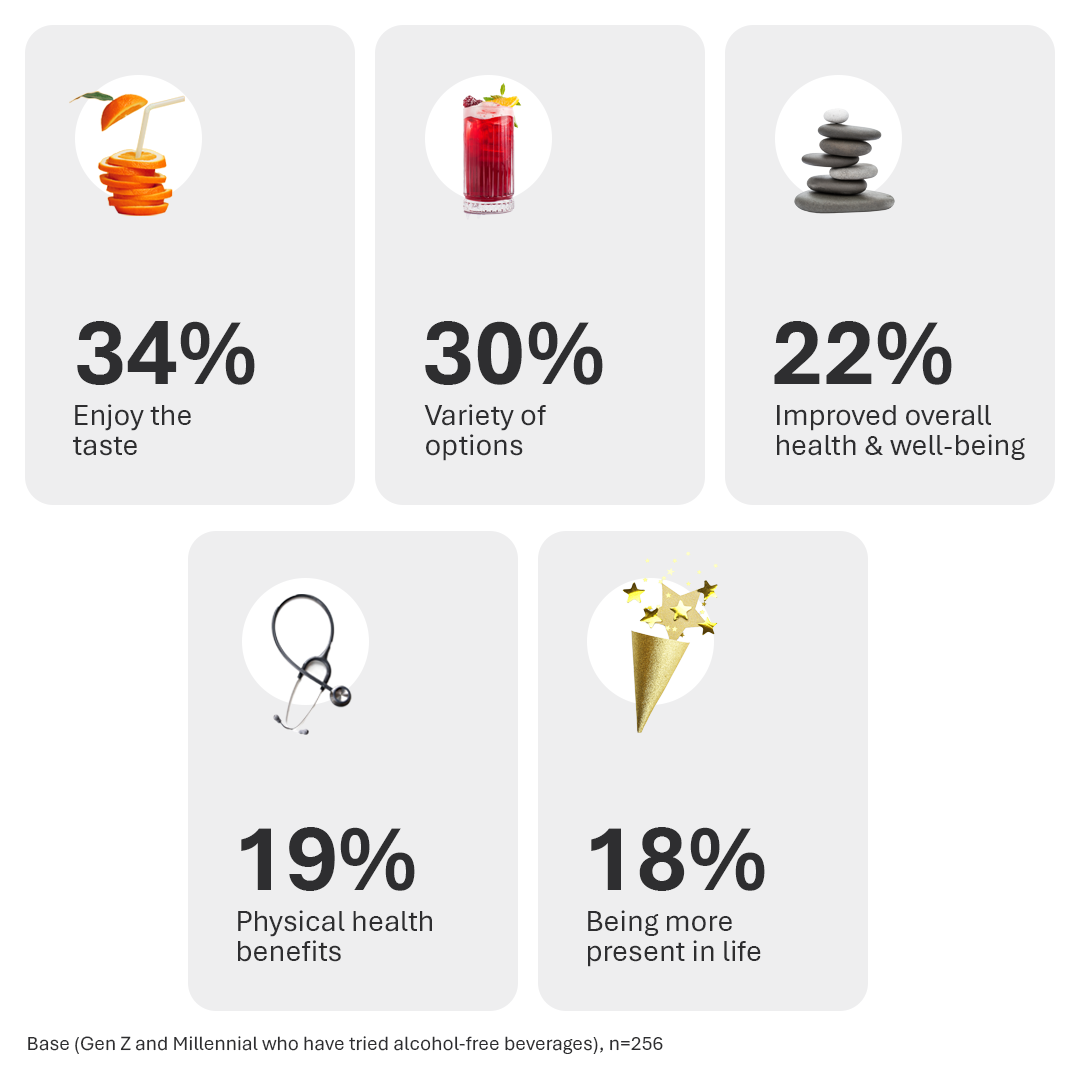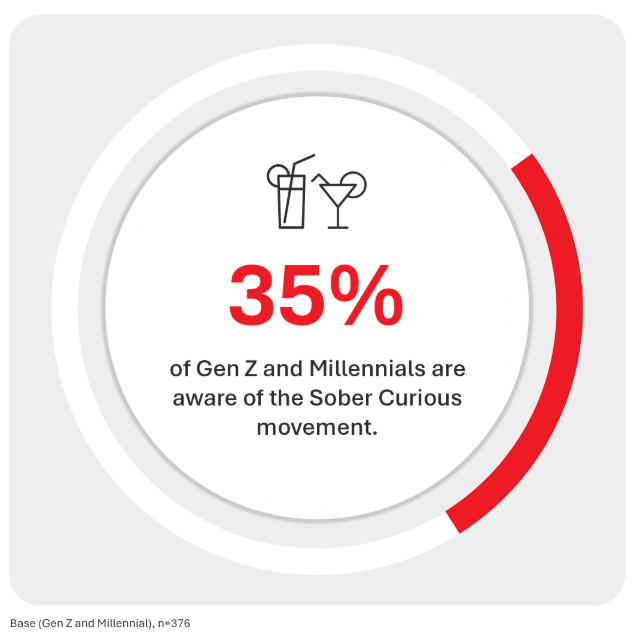The cultural shift around alcohol consumption is gaining momentum as Gen Z and Millennials are increasingly choosing to drink less alcohol. A new wave of young adults is prioritizing health, financial stability, and mindfulness, challenging traditional drinking norms and opening up to a sober curious lifestyle.
A Shift in Drinking Habits
According to our 2025 Beyond the Buzz study, a quarter of Gen Z and Millennials (21+ years old) who currently consume alcohol plan to cut back on their drinking in 2025. This change is not just a passing trend, but a reflection of deeper lifestyle shifts among younger generations.

Why Are Young Adults Drinking Less Alcohol?
To understand young adults’ motivations for reducing alcohol consumption, three key factors are identified, each reflecting a broader trend in how young adults approach their personal health and wealth in 2025.
- Personal choice (53%) – Many young adults are making a conscious decision to step away from alcohol without external pressure, suggesting a growing awareness of some of its impact.
- Health and well-being (48%) – With increased access to health information, more individuals are prioritizing physical, emotional, and mental well-being over alcohol consumption.
- Financial considerations (39%) – Rather than spending money on alcohol, many are saving or reallocating their funds toward other priorities that may include travel, wellness, and experiences.
The Rise of Alcohol-Free Alternatives and the Sober Curious Movement
As young adults cut back on alcohol, they are not abandoning the social aspects of drinking. Instead, they are incorporating alcohol-free beverages that allow them to maintain the camaraderie associated with drinking culture, without the intoxicating effects.
A significant portion of Gen Z and Millennials have already tried non-alcoholic options:

These alternatives provide an opportunity for young adults to enjoy gatherings and celebrations while making more mindful choices about their consumption. Whether at restaurants, bars, or casual get-togethers, individuals are increasingly reaching for non-alcoholic options that offer the same sensory experience and sense of inclusion without the downsides of alcohol.
Why Are Alcohol-Free Beverages Gaining Popularity?
The increasing popularity of alcohol-free beverages is a testament to the evolving preferences of younger generations. Unlike in previous decades, there were only limited choices—such as water, soda, or overly sweet mocktails—today’s market is filled with innovative, fun, and high-quality alcohol alternatives.
- Recess announced the launch of its Zero Proof Craft Mocktail collection on March 16, 2023. This collection features four flavors: Lime Margarita, Grapefruit Paloma, Watermelon Mojito, and Ginger Lime Mule. Each beverage is crafted to replicate classic cocktail flavors without alcohol and is infused with functional ingredients like guayusa and adaptogens to provide a balanced, uplifting effect.
- Athletic Brewing Company introduced its Free Wave Hazy IPA as a limited release, which quickly gained popularity and was subsequently added to their year-round flagship lineup on March 15, 2021. This non-alcoholic IPA is characterized by a medium body and is aggressively hopped with Amarillo and Chinook hops, offering notes of orange blossoms, citrus, and wheat. Today, according to a Forbes article, Athletic Brewing continues to lead the way in the alcohol-free craft beer space, earning shelf space in mainstream retailers and helping to normalize non-alcoholic options among beer enthusiasts—part of a broader shift towards a sober curious lifestyle.
- Meanwhile, Ghia, the non-alcoholic apéritif brand, blended strawberry and black currant juices with fermented white tea and holy basil to create Ghia Berry. The product has seen strong momentum, racking up over 5,500 orders in the first weeks of 2024 Dry January and driving a 132% year-over-year increase in retail sales.
These options are crafted to mimic the complexity and experience of traditional alcoholic drinks, offering bold flavors, refined ingredients, and a similar sense of indulgence. Young adults who have tried alcohol-free drinks cite the top reasons for consumption include:

Health awareness is also playing a growing role in the rise of the sober curious movement. Our recent report, From Glass to Risk: What do Americans Know about Alcohol Consumption and Cancer Risk?, reveals that many consumers remain unaware of the U.S. Surgeon General’s recent warning about the link between alcohol and cancer. As awareness grows, especially among Millennials and Gen Z—more individuals may be rethinking their drinking habits, not necessarily giving up alcohol entirely, but choosing to integrate more alcohol-free options as part of a balanced, wellness-driven lifestyle.
The Impact of the Sober Curious Movement
While there is still a long way to go, a growing number of young adults are becoming aware of the Sober Curious movement, which encourages individuals to explore a life with less alcohol. This movement has gained significant traction through social media, where health-conscious influencers and wellness advocates share their experiences with reducing alcohol consumption like…
- Jessica Landon (@jessicalandon12): A sober mom and advocate
- The Mindful Mocktail by Natalie Battaglia (@mindfulmocktail): A wellness-focused mocktail creator with tons of recipes
- James Swanwick (@jamesswanwick): A former sports journalist turned alcohol-free coach
- Christian Vierling (@christianvierling): A relatable sober humorist and TikToker
Platforms like Instagram, TikTok, and YouTube have become hubs for promoting a sober curious lifestyle, offering inspiration, tips, and community support for those considering the shift.

The movement resonates with younger generations because it aligns with their broader focus on healthy living. In fact, many Gen Z and Millennials are prioritizing mental clarity, improved physical health, and emotional well-being. Social media has amplified these values, making it easier for individuals to access and engage with content that supports a low-alcohol lifestyle. Among those aware of the Sober Curious movement:
- 36% discovered it through social media, highlighting the influence of digital platforms in shaping perceptions around alcohol consumption.
- 14% specifically credit health and wellness influencers for introducing them to the movement, demonstrating the power of relatable, real-life success stories in inspiring change.
After learning about the Sober Curious movement, 52% of Gen Z and Millennials say they are likely to participate in it in 2025. This suggests that alcohol reduction is not just a fleeting idea but an evolving lifestyle trend. With social media playing a crucial role in spreading awareness, more young adults are embracing mindful drinking and viewing it as a key component of a balanced, wellness-oriented life.
Thinking Beyond the Buzz: IDEAvate360
The decision to cut back on alcohol in 2025 is not about restriction but about choice. Gen Z and Millennials are redefining social drinking, opting for mindful consumption and alternative beverages that align with their values. With increasing awareness of health benefits and the rise of alcohol-free options, this trend is set to shape the future of drinking culture for years to come.
For brands, this shift presents a significant opportunity to innovate and expand their non-alcoholic product lines. Beverage companies are investing in alcohol-free alternatives, crafting sophisticated flavors, and marketing to a health-conscious audience. Bars and restaurants are also adapting their menus to accommodate this growing demand, ensuring that alcohol-free options are not just an after-thought but a core part of the experience. To stay ahead in this evolving market, brands can leverage tools like IDEAvate360, which helps them develop innovative products and future-proof strategies based on insights and emerging trends.
To kickstart your personalized innovation journey, speak to one of our experts about IDEAvate360.


